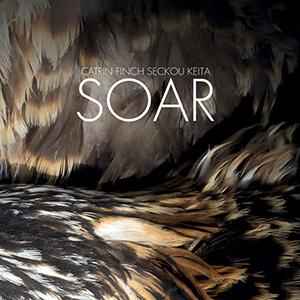Five years after their first collaboration for 'Clychau Dibon', Welsh harpist Catrin Finch and Senegalese kora player Seckou Keita took to the studio again for 'Soar'. The title of this new album refers to the flight of the majestic osprey that, after centuries of absence, was recently spotted in Wales again, where the birds come to breed annually after a journey of thousands of kilometres starting in West Africa. Opener 'Clarach' also refers to the bird species, as the song title is the name of the first osprey that came back to lay its eggs in the Cors Dyfi Nature Reserve near Machynlleth in Wales. "I like the bird's freedom to migrate to different places," says Seckou: "...they soar their way, and nothing stops them, but they know where they're heading, where they'll find peace and be happy. I've been on the same journey, but in a different way.". Where 'Clychau Dibon' was still an entirely instrumental album, on 'Soar' Catrin and Seckou's voices can also be heard. In closing track 'Cofiwch Dryweryn', for example, loosely translated "don't forget Tryweryn!", graffiti on a wall near the A487 between Cardigan and Aberystwyth that has become a Welsh national monument as it commemorates the 1965 flooding of the Tryweryn Valley to make way for the Llyn Celyn reservoir that was to supply Liverpool with water. The whole operation led to massive protests and the rise of nationalist parties like Plaid Cymru. "I wrote this piece a long time ago," Catrin says: "The Welsh language was disappearing fast; it wasn't being taught in schools, and then this happened and fuelled everybody's anger. It was an iconic moment.". '1677' is another song that is loaded with historical significance, as it was in that year that Vice Admiral Jean II d'Estrées stormed the Dutch fortress on Gorée, a small island off the coast of Senegal, and captured it in the name of his master King Louis XIV of France. The date marks the beginning of French domination in the region and, in the course of the next century, would turn Gorée into one of Africa's most important slave markets. "The piece is kind of blues sounding, dancey, but also dark," says Seckou: "...that sound, going back and forth between us, made me think about the rocking boat, about the people who could only express themselves through music, just over the waves.". Also worth mentioning is 'Bach To Baisso', in which Seckou and Catrin blend an aria from Bach's Goldberg Variations with 'Baisso', one of the oldest songs from the Senegalese kora repertoire. "That aria is probably one of the most famous pieces of (classical) music out there," says Catrin: "...but Bach himself was someone who was always experimenting. That's the reason he's respected in the way he is.". "Bach on the kora? I'm not sure it's ever been done before," Seckou adds. The duo has once again succeeded in producing a mesmerizingly beautiful album poetically underlining the connection and struggle of two very different peoples.


